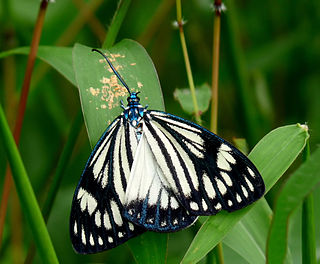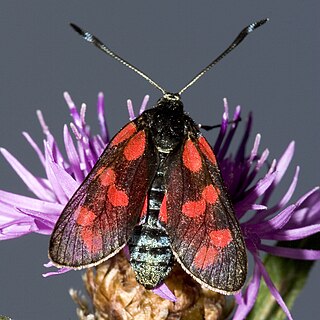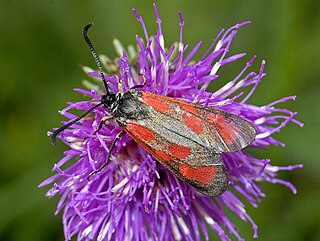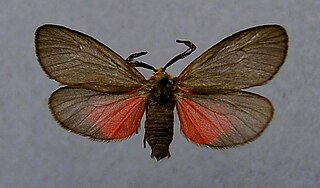
The Zygaenidae moths are a family of Lepidoptera. The majority of zygaenids are tropical, but they are nevertheless quite well represented in temperate regions. Some of the 1000 or so species are commonly known as burnet or forester moths, often qualified by the number of spots, although other families also have 'foresters'. They are also sometimes called smoky moths.

The Drepanidae is a family of moths with about 660 species described worldwide. They are generally divided in three subfamilies which share the same type of hearing organ. Thyatirinae, previously often placed in their own family, bear a superficial resemblance to Noctuidae. Many species in the Drepanid family have a distinctively hook-shaped apex to the forewing, leading to their common name of hook-tips.

The Zygaenoidea comprise the superfamily of moths that includes burnet moths, forester moths, and relatives.

Zygaena loti, the slender Scotch burnet, is a moth of the family Zygaenidae. It is a diurnal moth characterized by a black body, light colored legs, and red spots on its wings. The caterpillars are a yellow-green color and usually molt out of dormancy in late February to early March. The larvae feed on plants from the family Fabaceae until they enter their pupal stage and mature into adults in May to early June. For mating, Zygaenidae exhibit a dual-partner finding strategy, where females use pheromones while assuming a calling position, and males exhibit a patrolling behavior where they utilize both vision and the olfactory receptors in their antennae to locate a potential mate.

Aglaope infausta is a moth of the family Zygaenidae.

Procridinae is a subfamily of the family Zygaenidae.

Theresimima is a genus of moths. T. ampellophaga, the vine bud moth, is a moth of the family Zygaenidae. It is found from Algeria, Spain and southern France through most of southern Europe to the northern coast of the Black Sea. In the north, it ranges up to Hungary and Slovakia and in the east, the range extends to the southern part of European Russia, the western Caucasus and Transcaucasia, through Turkey, Lebanon and Syria to Israel.

Jordanita is a genus of moths of the family Zygaenidae.

Pollanisus viridipulverulenta, the satin-green forester, is a moth of the family Zygaenidae. It is found in the eastern part of Australia.

Jordanita globulariae, also known as the scarce forester, is a day-flying moth of the family Zygaenidae.
Hervé de Toulgoët was a French entomologist. He specialised in moths of the families Arctiidae and Zygaenidae. He also studied the beetle genus Carabus. He was written about by Paul Thiaucourt and Jocelyne Navatte.

Thyrassia is a genus of moths of the family Zygaenidae described by Arthur Gardiner Butler in 1876.
Thyrassia inconcinna is a species of moth in the family Zygaenidae first described by Charles Swinhoe in 1892. It is found in Queensland, Australia.
Thyrassia procumbens is a species of moth in the family Zygaenidae. It is found on Java and Sumatra.

Artona is a genus of moths of the family Zygaenidae.
Ichoria thyrassia is a moth of the subfamily Arctiinae. It was described by Zerny in 1931. It is found in Colombia.
Thyrassia subcordata is a moth in the family Zygaenidae. It was described by Francis Walker in 1854 from Sri Lanka. One subspecies is recorded, Thyrassia subcordata aurodiscaHampson, 1891.
Hiroshi Inoue was a Japanese entomologist specializing in Zygaenidae moths. During his career Inoue authored 148 species.
This page is based on this
Wikipedia article Text is available under the
CC BY-SA 4.0 license; additional terms may apply.
Images, videos and audio are available under their respective licenses.












